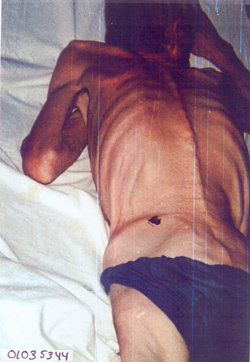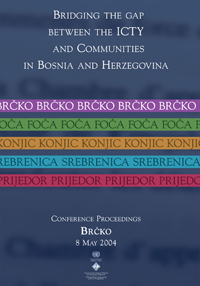 Photograph of a detainee taken by one
of the doctors working at the Trnopolje camp clinic. |
Both male and female prisoners were subjected to severe mistreatment which included beatings, rape, sexual assaults, torture and executions as well as harassment, humiliation and psychological abuse. The establishment of these camps was a result of an intentional discrimination against the non-Serb population, part of a plan to expel non-Serbs from the Prijedor municipality.
In addition to the crimes committed in the camps, killings of Muslims went on in many villages in the municipality, among them Hambarine, Biščani, Ljubija, Kozarac. On the 21 August 1992 a group of more than 200 unarmed men were transported from the municipality to Korićanske Stijene near Mount Vlašić, it was here they were executed by Serb police forces and their bodies thrown into a ravine. Only 12 persons survived. It was found that more than 1,500 killings occurred in the municipality.
|
Making use of the enormous volume of evidence presented in the cases, representatives from the Tribunal were able to provide an insight into the meticulous investigations conducted by the Prosecution and explain how allegations of murder, torture and other crimes were proven before the court. The conference focused on six cases in which final judgements had been rendered.
The event looked at judgements handed down against twelve suspects. Duško Tadić, a local Serb politician, found guilty of the forced transfer of civilians to detention camps and of murder, was sentenced to 20 years' imprisonment. Duško Sikirica, Damir Došen and Dragan Kolundžija, officials at Keraterm camp, pleaded guilty. Sikirica, a camp commander, was sentenced to 15 years’ imprisonment.
Došen and Kolundžja were sentenced to five and three years respectively. Zoran Žigić, Mlađo Radić, Miroslav Kvočka, Milojica Kos and Dragoljub Prcać were all found guilty of crimes committed in the Omarska camp. They were sentenced to 25, 20, seven, six and five years’ respectively.
Biljana Plavšić pleaded guilty to persecution on political, racial and religious grounds, a crime against humanity and was sentenced to 11 years’ imprisonment. Darko Mrđa also entered a guilty plea to one case of murder and another of attempted murder in connection with the killing of more than 200 non-Serb men from Prijedor on 21 August 1992 in Koričanske Stijene. He was sentenced to 17 years’ imprisonment.
Finally, Predrag Banović, a guard at Keraterm camp, entered a guilty plea and acknowledged his responsibility for participating in five murders and the beatings of 27 other victims. For these crimes he was sentenced to eight years' imprisonment.
Reactions of the audience highlighted the need to persist with efforts to bring to justice perpetrators of all crimes, regardless of the nationality of the victims or the perpetrators. ICTY representatives reiterated the Tribunal’s preparedness to continue to do all it can to assist domestic authorities in bringing further prosecutions.
The full report contains a summary of proceedings using the transcripts from the day, including opening remarks, presentations from Tribunal staff, photographs used as evidence in the cases and questions from the audience.
| Kvočka et al. case
|
|||||
 M. Kvočka |
 D. Prcać |
 M. Kos |
 M. Radić |
 Z. Žigić |
|
| Duško Tadić case
|
Duško Sikirica case |
|||
 D. Tadić |
|
 D. Sikirica |
||
| Other ICTY cases related to the Prijedor area: |
| Banović ♦ Brđanin ♦ Karadžić ♦ Krajišnik ♦ Krstić ♦ Mejakić et al. ♦ Milošević, Slobodan ♦ Mladić ♦ Mrđa ♦ Plavšić ♦ Stakić ♦ Župljanin and Stanišić |


